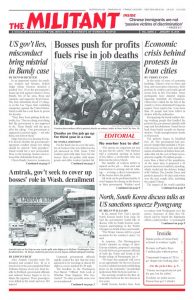In his annual New Year’s speech, North Korean leader Kim Jong Un said his government would like to discuss with its South Korean counterparts participating in the Winter Olympics in South Korea next month.
“The Winter Games will be a good occasion for the country’s unity,” he said.
In response, Cho Myoung-gyon, Seoul’s minister in charge of inter-Korean relations, proposed a meeting be held between government officials of both the North and South at the border village of Panmunjom Jan. 9.
“We hope this proposal will serve as an opportunity for the two Koreas to seek a solution towards establishing peace on the peninsula,” presidential spokesman Park Su-hyun said Jan. 1.
The meeting would be the first official talks between the two Koreas in two years.
South Korean leaders have been in contact with Washington over the moves. Secretary of State Rex Tillerson said he hoped the diplomatic efforts could produce “a meaningful path leading to denuclearization.”
North Korea “now wants to talk to South Korea for the first time,” President Donald Trump tweeted Jan. 2. “Perhaps this is good news, perhaps not — we will see!”
These developments occur as Washington through the U.N. Security Council has been ramping up sanctions against the Democratic People’s Republic of Korea, aimed at forcing Pyongyang to the bargaining table to discuss its nuclear weapons and intercontinental missile program.
The Security Council has passed a series of measures banning the DPRK’s exports of coal, iron ore and sea products and curtailing the employment of North Korean workers in other countries. The harshest of these resolutions, adopted by unanimous vote at the end of December, also aimed at reducing exports of oil to North Korea.
Seoul recently seized two oil tankers on suspicions they were used to smuggle petroleum products to North Korea through ship-to-ship transfers in international waters. The U.S. rulers have also had some success in getting Beijing to cut back its trade with Pyongyang. These economic attacks hit working people the hardest.
In November, South Korean President Moon Jae-in proposed the postponement of joint military maneuvers with Washington until after the Olympics. These “war games” involve tens of thousands of U.S. and South Korean troops in practice assaults on the North.
“South Korea has proposed that the North Korean athletes travel through the 2.5-mile-wide Demilitarized Zone,” reported the Jan. 2 New York Times. “It also wants to discuss the possibility of two Korean delegations marching together in the Games’ opening ceremony” and “whether the North plans to send a cheering squad.”
Washington’s Korean War never ended
With the agreement of Moscow, Washington seized southern Korea after the second imperialist world war, aiming to take control over all of Korea, while workers and farmers in the north won independence through revolutionary mobilizations. Washington and the puppet regime of Syngman Rhee it imposed on the south crushed revolutionary struggles there. U.S. troops invaded the north in 1950, but the Korean people, backed by troops from China, fought Washington to a draw. A cease-fire was signed in 1953, but the U.S. rulers to this day refuse to sign a peace treaty with the DPRK.
Since the 1940s, the Socialist Workers Party has championed the fight of Korean workers and farmers for one, united Korea, and has demanded the withdrawal of the more than 28,000 U.S. troops stationed in South Korea. The SWP also backs the demand for a nuclear-free Korean Peninsula and Pacific and for unilateral nuclear disarmament by Washington.

